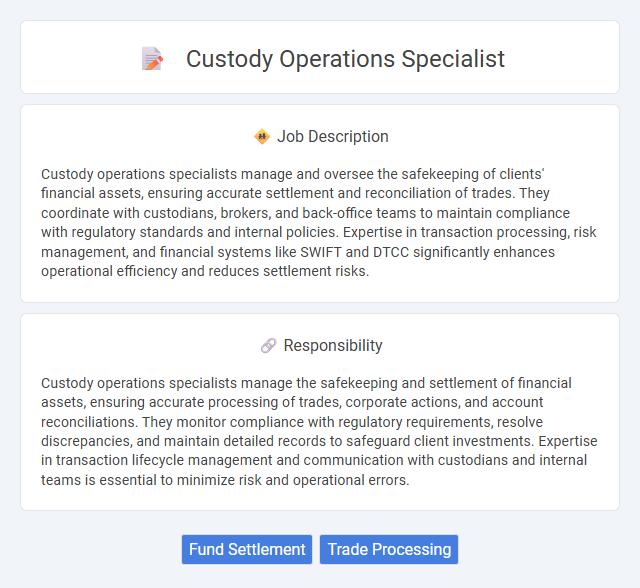
Custody operations specialists manage and oversee the safekeeping of clients' financial assets, ensuring accurate settlement and reconciliation of trades. They coordinate with custodians, brokers, and back-office teams to maintain compliance with regulatory standards and internal policies. Expertise in transaction processing, risk management, and financial systems like SWIFT and DTCC significantly enhances operational efficiency and reduces settlement risks.
Individuals who possess strong analytical skills and attention to detail are more likely to succeed as Custody Operations Specialists. Those comfortable working in fast-paced environments with regulatory compliance and risk management responsibilities may find this role suitable. People with a preference for routine workflows and effective communication typically have a higher probability of matching the job demands.
Qualification
A Custody Operations Specialist requires a strong background in finance, banking, or accounting, often demonstrated through a bachelor's degree in business administration, finance, or a related field. Professional certifications such as Certified Treasury Professional (CTP) or Chartered Financial Analyst (CFA) can enhance job prospects. Key qualifications include expertise in securities settlement, risk management, regulatory compliance, and proficiency with custody systems like SWIFT and Bloomberg Terminal.
Responsibility
Custody operations specialists manage the safekeeping and settlement of financial assets, ensuring accurate processing of trades, corporate actions, and account reconciliations. They monitor compliance with regulatory requirements, resolve discrepancies, and maintain detailed records to safeguard client investments. Expertise in transaction lifecycle management and communication with custodians and internal teams is essential to minimize risk and operational errors.
Benefit
Custody operations specialists likely offer significant benefits such as ensuring the accurate management and safekeeping of financial assets. This role probably enhances operational efficiency by streamlining transaction processing and maintaining regulatory compliance. Employers and clients may benefit from reduced risk of errors and improved trust in asset protection.
Challenge
Custody operations specialists likely face challenges related to managing complex financial transactions and ensuring regulatory compliance with high accuracy. The role probably demands strong attention to detail to mitigate risks associated with asset custody and settlement processes. Handling rapid market changes and resolving discrepancies efficiently might also present frequent difficulties.
Career Advancement
Custody operations specialists manage the safekeeping and administration of financial assets, providing critical support in trade settlement and asset reconciliation. Expertise in compliance, risk management, and financial systems enhances opportunities for promotion to senior operations roles or portfolio management positions. Continuous skill development in blockchain technology and regulatory frameworks can accelerate career advancement within banking and asset management sectors.
Key Terms
Fund Settlement
Custody operations specialists in fund settlement manage the accurate and timely processing of trade settlements, ensuring compliance with regulatory standards and internal controls. They coordinate with custodians, clearing agents, and counterparties to reconcile discrepancies and confirm the transfer of securities and cash. Expertise in settlement cycles, risk mitigation, and settlement lifecycle automation is essential to maintain operational efficiency and minimize settlement failures.
Trade Processing
Custody operations specialists play a crucial role in trade processing by ensuring accurate settlement and reconciliation of securities transactions within financial institutions. They verify trade details, manage trade confirmations, and resolve discrepancies to maintain compliance with regulatory standards and mitigate operational risks. Expertise in processing equities, fixed income, and derivatives trades supports efficient asset safekeeping and seamless transaction lifecycle management.
 kuljobs.com
kuljobs.com